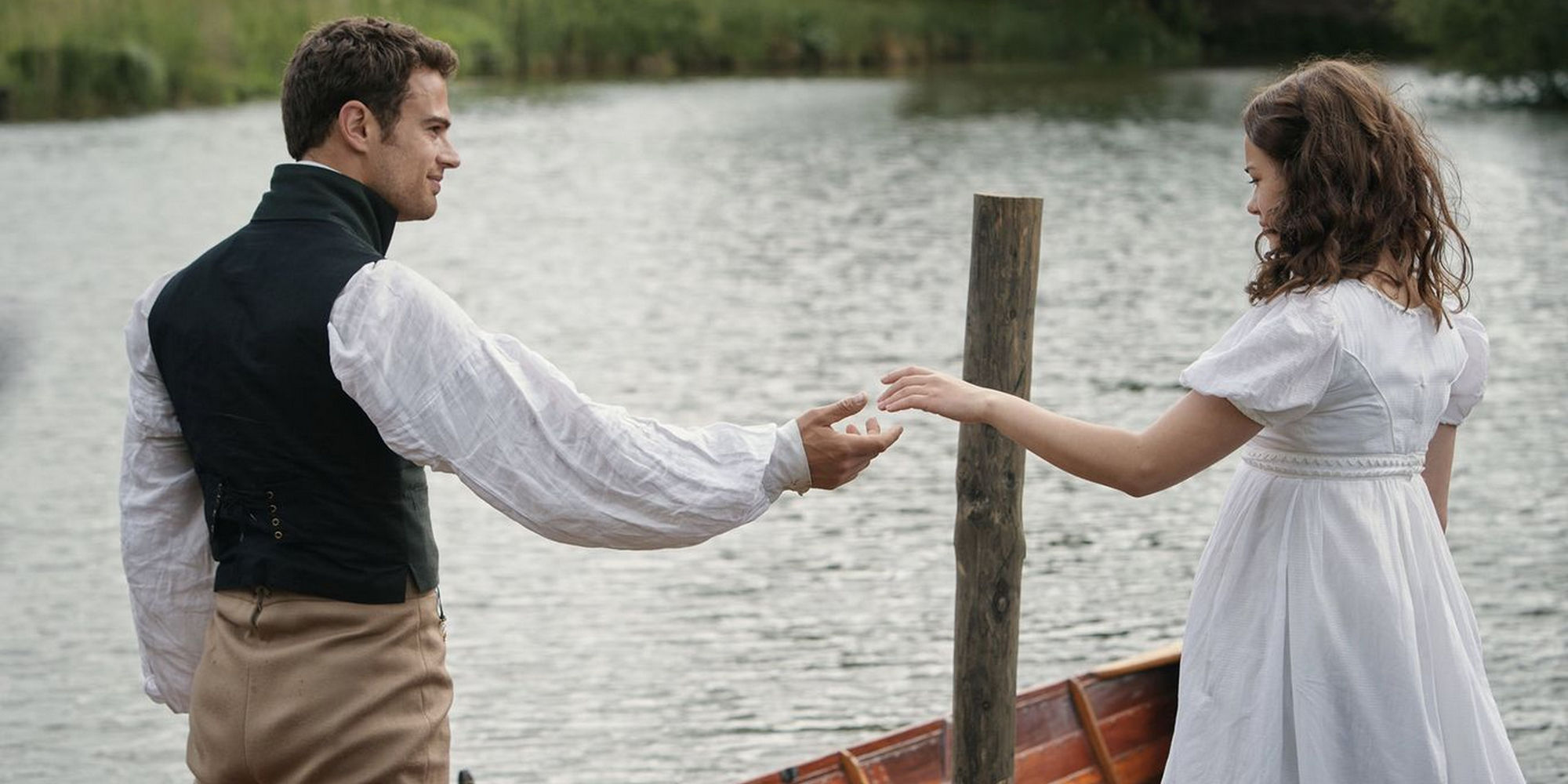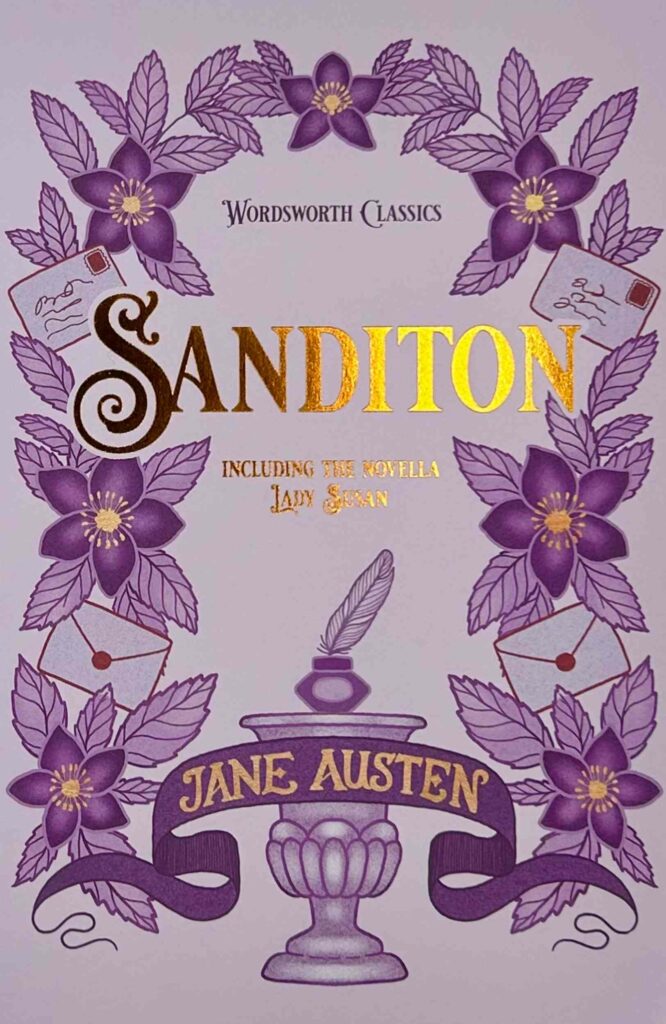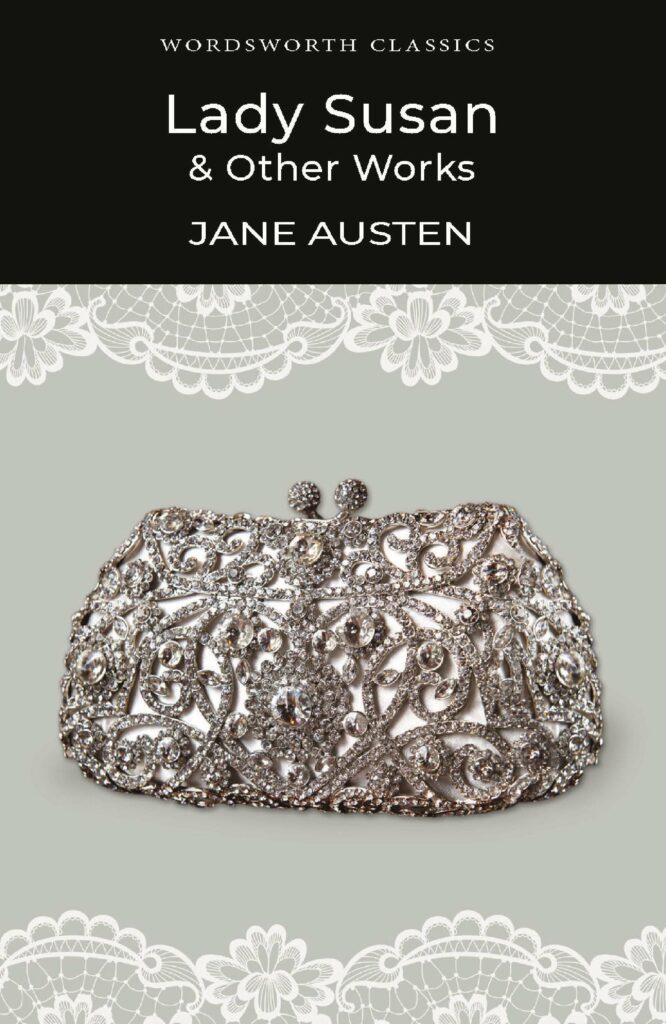
Sanditon: An adaptation for our times
This blog is written more in sorrow than in anger. I have struggled valiantly through all eight hour-long episodes of Andrew Davies’s ITV adaptation and continuation of Jane Austen’s Sanditon.
Without the incentive of writing about it here, I would have abandoned the series in disgust and contempt. For contempt is just what Davies has shown for Austen. Repeatedly, wilfully, increasingly with each episode, he has stamped all over her characteristic qualities of understatement, irony, complexity and wit. Where she has a fine ear for speech, he gives us a cloth ear. Where she observes human behaviour sardonically but compassionately, he gives us leaden stereotypes. Where she shows a highly tuned understanding of the social mores of her day, including the circumscriptions created by class and money, his characters trample down those boundaries. And where her characters keep their clothes on, his are forever taking them off.
Ok, ok, I do get it. He is dragging Jane Austen into the 21st century, and cheerfully holding up two fingers to anyone kicking and screaming. It’s not as if I’m a Janeite, or indeed a full subscriber to Austen’s claim to preeminence. I see all that’s wrong with her work, including the aforementioned prescriptions of class and money, which she endorses even as she critically observes them. I’m uncomfortably aware that while her vision is acute it is also blinkered. And Davies is simply bringing into plain sight the sexual desires that drive so many of Austen’s relationships, necessarily kept hidden or unexplored because of social and cultural norms. But, but, but.
This adaptation started reasonably enough, introducing the key characters Austen outlines in her twelve chapters, in approximately the same settings as she uses. As in the novel, we are quickly removed from rural Sussex to Sanditon, the eponymous seaside place which Austen seems to have placed innovatively as a central character in her story. After that, Davies is on his own. Certainly, Austen’s draft chapters give very little idea of where the story might go. Her niece Anna Lefroy attempted a continuation after her death, drawing on conversations she had had with her Aunt Jane about the novel as she planned and wrote it in her last months. But her attempt apparently foundered on the storyline, and it was abandoned, also unfinished. Oddly, Davies too, with his characters, setting, and fascinating social situation provided for him, seems to stumble with the plot. Perhaps the blank sheet was too blank.
For what we have in his Sanditon is not a fully rounded drama, but a series of incidents. The characters who should be driving the action, and for whose development he is solely responsible, are either naïve ingénues (the lead female figure, Charlotte Heywood, reminiscent of Catherine in Northanger Abbey), or scheming stereotypes (Edward and Esther Denham, and the impoverished Clara Brereton, who circle Lady Denham), or characters so inconsistent they’d be at home in the current incarnation of The Archers (Sidney Parker). Though unlike the characters in The Archers, they don’t have any consistency to be now inconsistent with. There are one or two interesting exceptions, rescued more by fine acting than by fine writing. Lady Denham is the lynchpin of the drama, as she would clearly have been in the novel, and Anne Reid’s magisterial performance suggests both present steel and past suffering. We can imagine she might have been a Charlotte once, though this is indicated only by her extreme cynicism when she bumps up against Charlotte’s highly irritating fresh-eyed Panglossian optimism (Rose Williams, with two expressions – wide-eyed, for happy amazement, narrow-eyed, for unhappy amazement). Amongst Davies’s new creations, Young Stringer (Leo Suter) is set up as a love interest for Charlotte, nineteenth-century social distinctions ripped up here in favour of a promising pairing, just about credible in the freer, more democratic atmosphere of the seaside resort. He is the architect/builder of ‘new’ Sanditon (we might think of a young Thomas Hardy) and an undeniably genial and attractive character to act as a counterpoise to the erratic and labile, but conventionally handsome, Sidney Parker (Theo James).
The other interesting new character is Lord Babington, who has an emotional complexity denied to his buffoonish fellow aristocrats; when he is paired with the apparently chilly Esther, the screen crackles to life. Their two-hander in episode 5, when Babington makes a heartfelt proposal of marriage and Esther is moved, against her own will, and almost won over, is worthy of Austen. And this is followed up in episode 7 with further development of their relationship, again both credible and moving, as he elicits genuine depth of feeling from the damaged Esther. Here the actors (Mark Stanley and Charlotte Spencer) breathed real life into their personal story, taking full advantage of the greater emotional complexity afforded by Davies.
But let’s not get carried away. These are rare glimpses of gold amidst pure dross. And they are generally not part of any coherent narrative or dramatic development. Similarly, set pieces such as the cricket match between the posh chaps and the locals (a gift wasted), or the groaning sub-plot of Miss Lambe (Crystal Clarke) and her black suitor, neither carry the main story forward nor reveal more about the characters and their relationships. They are stand-alone dramas, allowing another bit of sensationalised anachronistic flim-flam, such as Charlotte taking over Tom Parker’s place at the wicket and winning the match, or Charlotte heading off alone to London to try to find the errant Miss Lambe.
We might allow the obvious inauthenticities in favour of bringing Austen into the 21st century; but to what end, when Austen herself is pointing the way to new and intriguing themes? Sanditon the novel provides an extremely interesting progression in her work, in at least two ways. One is indeed the inclusion of Miss Lambe, Austen’s only black character, and both rich and a woman to boot. What might she have done with her? More, one would hope, than the clichéd romantic events minimally presented here. The other is the placing of the seaside itself centre stage, providing the milieu in which the landed aristocracy gives way to the values of speculation and profit rather than entrenchment and conservation of wealth. Here we have to get and spend, even in the circulating library, where Charlotte’s purchase of Fanny Burney’s Camilla (a significant choice of a female novelist by Austen) might just as well have been that of a trinket, for in the library there are ‘all the useless things in the world that could not be done without’. This is, after all, the seaside – beach reading and souvenirs, people cheek by jowl of whatever class, and all eventually able to leap into the same ‘Sea, dancing and sparkling in sunshine and Freshness’. Here was fascinating new ground for Austen, and ample material for Davies and the production team to do something meaningful, to show society at a point of unsettling change, characterized by those shifting waves themselves, to link, indeed, to our present turbulent times. Instead, we get the brothers Carter undressing rapidly and running into the sea, completely naked. That’s not something that would happen on a beach in Margate even now. Let alone Sidney Parker arising from the sea in like some Botticelli Venus to confront a Charlotte wandering the seashore and enjoying herself and her own company. Not only a woman in the 1800s would have fled – I’d probably flee myself isolated thus with a powerful naked man. My point here is not to object to the nudity, but to its meaninglessness in the larger scheme of things. It adds nothing. And as for the attempt to defend it in terms of redressing the gender balance and allowing the pleasure of the female gaze: three male bums running out of the camera, and a ‘full’ frontal, not even fully shown? Disingenuous as well as gratuitous.
Of course, Davies has form with this, and there’s a nod to Poldark, as well as an ironic self-referencing of Colin Firth’s wet-shirted Darcy. But enough with the self! What on earth is the point of adapting Jane Austen’s work in the first place if you have no respect for her central strengths? So much could have been done here, whilst still keeping a twenty-first-century audience fully engaged, rather than sinking to the lowest televisual level, as exemplified in episode 6 when Clara and Edward have rampant sex in the drawing-room as Lady Denham struggles for her life in a nearby room. As I watched I was reminded of great scenes of filmic full-on sex. It’s never going to be easy – there’s that squirming if one is in the company of anyone either twenty years younger or twenty years older. The ones I remember were not necessarily successful but they were sincere, rooted in story and character, arising naturally from the action. Tom Jones, Moll Flanders, Lady Chatterley in its most recent television incarnation. Does anyone remember the original A Bouquet of Barbed Wire? Now that had incest in spades. But it was fully developed as a drama, entirely believable, the sexual relationships springing from carefully drawn characters. There’s a provenance here.
And we can also see how Austen does it so much better. Her Edward, albeit drawn briefly, is immediately established as someone who wants to see himself and be seen as dastardly and dashing. In this position, he is ironised by Austen, shown to be self-regarding and self-deceiving. Davies’s Edward is dastardly and dashing; he leads on his sister into an incestuous relationship, whilst playing sexual power games with Clara. With no narrative or dramatic irony to intervene, he is simply the villain, and Clara is made a simple villain too, at least at the start.
Sadly, the finale of Sanditon only accentuated the weaknesses outlined. Not enough that Sidney Parker should have abandoned Charlotte, after a romantic but interrupted proposal, apparently committing himself to a loveless marriage in order to save his brother’s fortunes and Sanditon itself. But then he has to do one of those galloping-alongside-the-coach scenes. And to no avail! For goodness sake, if you do have to have a galloping scene, make it do something (and by the way, there was far too much galloping). This was just Sidney saying sorry for having left Charlotte in the lurch. Thanks, Sidney; bet Charlotte was really happy with that. Young Stringer was left as he started, a useful sub-plot to keep the audience interested, with no chance of success with Charlotte, and doomed to lose his father to boot. And of course to a fire that destroyed a good part of uninsured Sanditon. The sudden marriage of Lord Babington and Esther might have provided an Austenian happy ending, but it came out of the blue and went back into it – though theirs was the best, and best-founded, the chance of happiness, genuinely prepared for through the previous episodes. And what of Miss Lambe? This was surely a storyline that could have teased out the complexities of colonialism and slavery in a most interesting way. Yet we never found out exactly what Sidney Parker’s relationship to his ward concealed, and Miss Lambe herself presented as a sulky figure. However much that may have been warranted – we are not privy to her internal workings.
Elsewhere, and often, Andrew Davies has shown his ability to rise to the heights of the great writers he adapts. His recent television versions of War and Peace and especially Les Misérables were wondrous. But, sad to say, given the opportunity to make up his own stories rather than adopting those of some of the finest writers in the tradition, he is found wanting. That is not surprising, nor is it a matter of regret for this great artist of our times and our media. Adapting for television is one thing, writing a novel is another. Both are great creative achievements, if within different genres. It is a great gift to be able to bring a nineteenth-century novel to a twenty-first-century audience through the mass medium of television. It is sad therefore to see Andrew Davies deliberately, naughtily, arrogantly squander that gift in this cynical way. Truly an adaptation for our current times.
Books associated with this article

Sanditon & Other Works
Jane Austen
